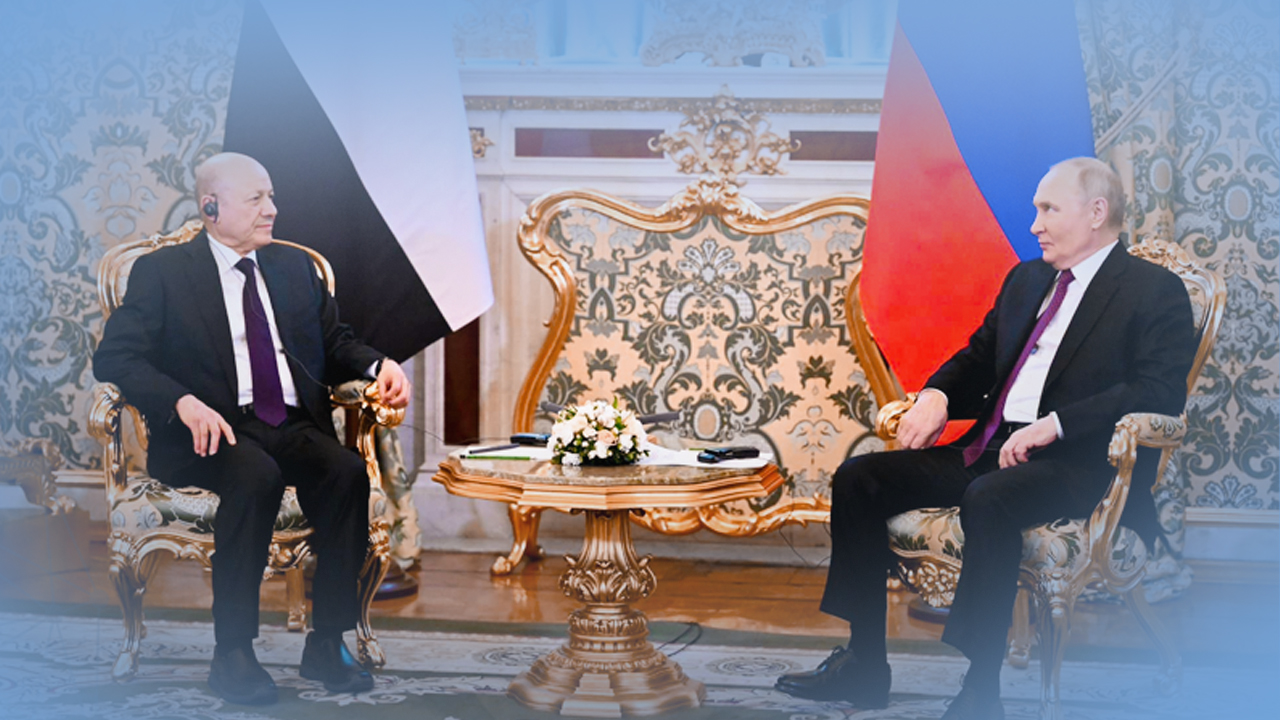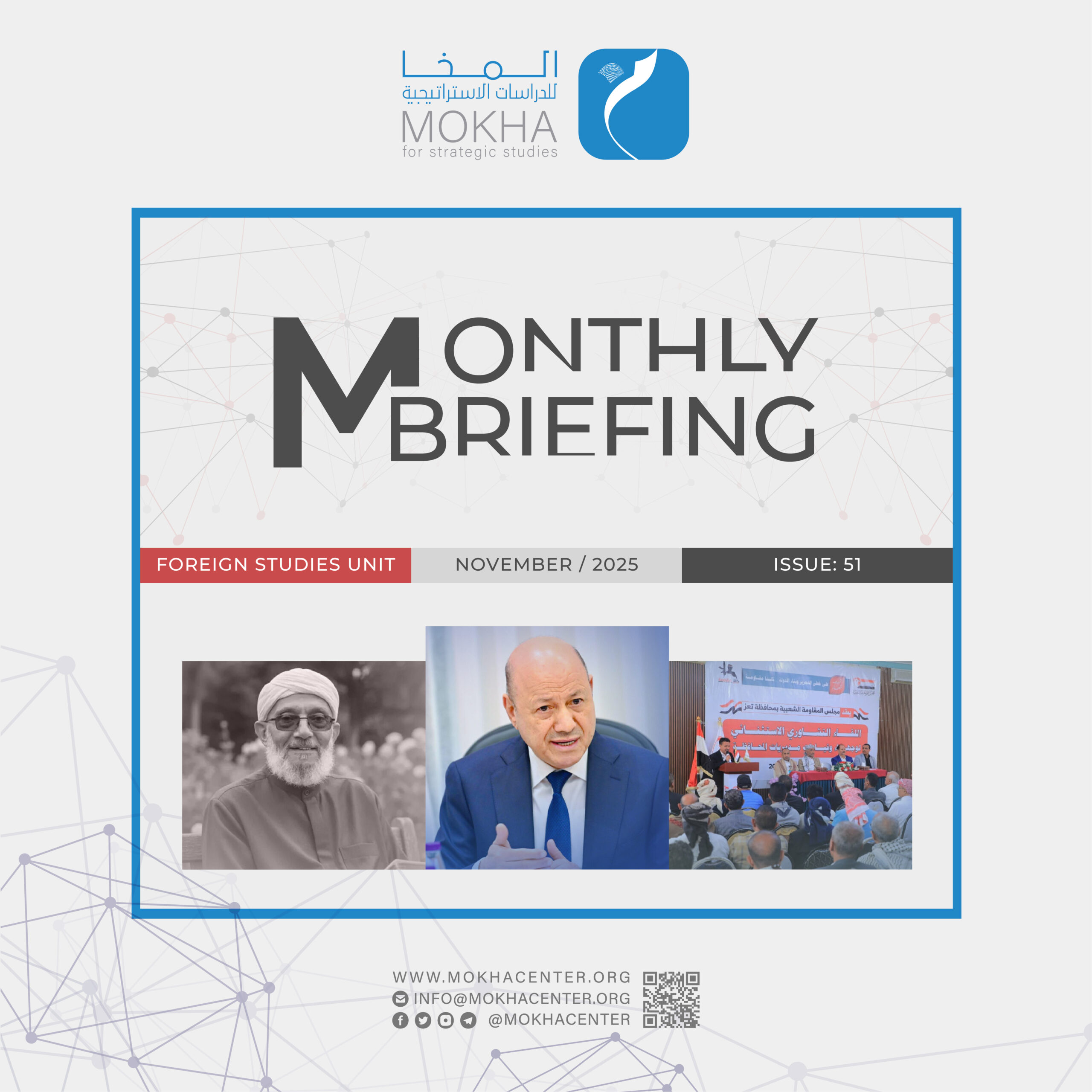A Review of the PLC Chairman’s Visit to Russia

On May 27, 2025, Rashad Al-Alimi, the chairman of Yemen’s Presidential Leadership Council (PLC), visited Moscow and met with Russian President Vladimir Putin, State Duma Speaker Vyacheslav Volodin and other senior Russian officials. The visit came at a critical time, amid rapid regional changes and was part of the legitimate Yemeni government’s broader efforts to build stronger ties with major international powers — particularly to counter the Houthi group on the global stage. This was especially significant in light of recent reports about potential Russian military support for the Houthis.
During his visit, Al-Alimi appeared in an interview on Russia Today (RT) on May 29, in which he outlined the government’s position on the ongoing conflict with the Houthis. He also awarded the Order of Merit to Vitaly Naumkin, director of the Institute of Oriental Studies of the Russian Academy of Sciences, in recognition of the institute’s work in preserving the linguistic heritage of Socotra Island, highlighting the cultural and historical links between Yemen and Russia. This report provides an overview of the context, motivations and key dimensions of the visit.
Context of the Visit
Yemen remains mired in a complex and prolonged conflict, and the legitimate government is seeking greater international engagement to break the deadlock — especially through deepening relations with Russia, a key regional player. The significance of President Al-Alimi’s visit can be understood through the following points:
-
- Political and military stalemate: The Houthis continue to reject political solutions and have escalated military activity on several fronts, worsening the humanitarian and economic crisis in Yemen. This increases the need for international support, whether to push for peace or to bolster legitimate resistance efforts.
- Russia’s dual engagement: Moscow maintains contact with all Yemeni factions, including the Houthis, and has been accused of providing them with weapons and logistical support. This creates a pressing need for the Yemeni government to balance the narrative and strengthen its ties with Russia.
- Diverging regional interests: While Russia and Iran share some strategic goals, they differ on certain issues, like Syria and Yemen. Russia appears keen to avoid Yemen becoming a battleground for global rivalry, preferring it to be an area of shared influence rather than open conflict.
- Countering Houthi influence in Russia: Houthi delegations have repeatedly visited Russia, meeting with officials and think tanks to present their perspective on the conflict. In response, Al-Alimi met with Russian lawmakers, academics, media outlets, and Arab diplomats to communicate the Yemeni government’s stance and challenge the Houthis’ narrative.
- Reassuring international partners: Questions have arisen internationally about the cohesion of the PLC. Al-Alimi addressed these concerns by categorizing the internal disagreements within the council as normal, emphasizing their commitment to shared national interests. This reassurance is vital to maintaining international trust in the council’s ability to govern effectively.
Motives Behind the Visit to Russia
President Rashad Al-Alimi’s visit to Russia was driven by the goal of expanding avenues of cooperation and coordination with Moscow across political, economic, military and cultural domains. The composition of his delegation — which included the Minister of Foreign Affairs and his Advisor for Defense, Development and Culture — underscored the broad and strategic scope of the visit. While Russia has publicly voiced support for Yemen’s legitimate government, the high-level nature of the visit signaled a desire, on the part of Yemeni leadership, to encourage Russia to take a more active and impactful role in shaping developments on the ground.
In his interview with Russia Today, President Al-Alimi shed light on some of the key objectives behind the visit. He reiterated that “a political solution is best for Yemen, the region and the world,” but stressed that “the Houthis do not believe in peace, and all previous efforts with them have failed.” This statement conveyed a clear message: Traditional diplomatic efforts have reached a dead end due to the Houthis’ intransigence. It also served as a subtle appeal to Russia to move beyond rhetorical support and take more concrete steps — particularly in the areas of military assistance and safeguarding international maritime routes.
Al-Alimi further underscored Russia’s stated support for Yemen’s legitimate government, saying, “Russia supports legitimacy in Yemen and the relevant Security Council resolutions. It cannot align itself with a sectarian group, like the Houthis.” He emphasized that Russia’s natural role lies in supporting the legitimate authorities and that backing the Houthis would run counter to its historical policy. This message was intended to reinforce Moscow’s official recognition of Yemen’s legitimate government and to encourage a more consistent and tangible Russian stance against the Houthi movement.
During his meetings in Moscow, President Rashad Al-Alimi reaffirmed the Yemeni government’s commitment to internationally recognized frameworks for resolving the conflict. At the same time, he sharply criticized the Houthi group, labeling them a “Nazi group” that “does not believe in peace,” and noting “all previous efforts with them have failed.” By using such strong rhetoric, Al-Alimi aimed to highlight the Houthis’ extremism and human rights violations, framing them in terms that resonate with the international community — particularly Russia, given its historical struggle against Nazism.
In his interview with Russia Today, Al-Alimi emphasized Yemen’s urgent need for air defense systems to protect critical infrastructure, including airports and seaports. He expressed his intention to explore all available options for securing such support and voiced hope for help from both Arab allies and Russia. This statement subtly signaled a decline in support from the Arab Coalition and reflected Yemen’s growing interest in Russian military assistance.
President Al-Alimi also worked to convey the broader threat posed by the Houthis, which extends beyond Yemen’s borders. He warned that their actions endanger regional and international security, particularly through threats to maritime and air navigation — factors that could destabilize global trade and the wider economy. By framing the Houthi threat in this way, Al-Alimi sought to reposition the Yemeni conflict as an international security issue, not just a domestic crisis.
He referenced the Houthi targeting of aircraft at Sana’a International Airport as an example of how their control over vital infrastructure directly undermines regional stability and aviation safety. This approach was clearly designed to rally international actors whose interests are closely tied to the security of global air and maritime routes.
The presence of Presidential Advisor for Defense and Security Lieutenant General Mahmoud Ahmed Salem Al-Subaihi suggests that military cooperation discussions went beyond air defense. It likely included plans for intelligence-sharing and broader defense collaboration. Similarly, the inclusion of Development and Reconstruction Advisor Omar Al-Amoudi pointed to an interest in reviving long-term development and rebuilding efforts — an agenda not publicly emphasized but clearly part of the visit.
In his RT interview, Al-Alimi recalled Russia’s long-standing role in Yemen’s economic development, dating back to the 1962 revolution, and the establishment of key infrastructure. By invoking this historical partnership, he appeared to extend an invitation for Russia to reengage as a development partner in the post-conflict phase.
The presence of Marwan Damaj, advisor for Cultural Affairs, further underscored that the visit wasn’t confined to political and military matters. It reflected a broader strategy to foster cultural and scientific ties — efforts that could help lay the groundwork for a deeper, more strategic long-term relationship between Yemen and Russia.
However, Al-Alimi’s interview also revealed some missteps. His admission that Yemenia Airlines aircraft had been handed over to the Houthis under threat of attack appeared to highlight the government’s limited defensive capabilities — potentially casting doubt on its ability to protect critical assets. Additionally, his remark that Yemen is under Chapter VII of the UN Charter and therefore unable to import weapons was inaccurate. In reality, the arms embargo targets the Houthi group and affiliated individuals — not the legitimate government.
Finally, his comments on Yemeni unity came across as weak and detached, resembling the stance of a neutral mediator rather than a leader directly involved in shaping the future of the country. This may have diluted the message of resolve and leadership that the visit intended to project.
Outcomes of the Visit
President Rashad Al-Alimi’s visit to Moscow marks a potential shift in the legitimate Yemeni government’s foreign policy — aiming to clarify the political nature of the conflict and reinforce Yemen’s national narrative on the international stage. The timing of the visit aligns with Russia’s sensitivity to being perceived as a supporter of the Houthi group, which is designated as a terrorist organization by the United States and several Gulf and Arab countries. This context may prompt Russia to deepen its engagement with Yemen’s internationally recognized government.
The visit is expected to pave the way for expanded Russian support, particularly through the activation of bilateral agreements in such key areas as energy, infrastructure and economic cooperation. The presence of senior officials and the broad agenda discussed signal an intention to translate diplomatic dialogue into actionable partnerships.
However, Russia’s approach — while publicly supportive — will ultimately be shaped by its broader strategic interests in the region. Moscow is likely to remain cautious, aiming to maintain a balance in its relations with various regional powers, especially Iran. As a result, while Yemen’s political visibility in Russian policymaking may have improved, the lasting impact of the visit will depend on whether Russia follows through on its promises with concrete actions.
The real measure of success will lie in the formation of joint committees, follow-up mechanisms and the actual implementation of the discussed agreements. Only then can the visit be seen as a turning point in Yemen-Russia relations and a meaningful step toward stronger international backing for the legitimate Yemeni government.

